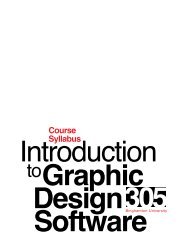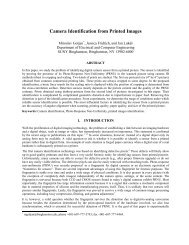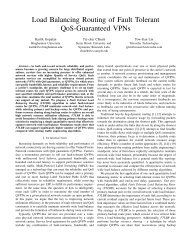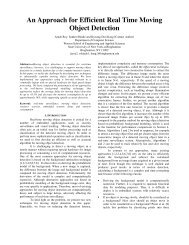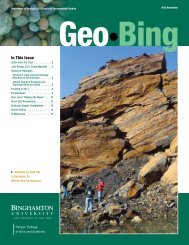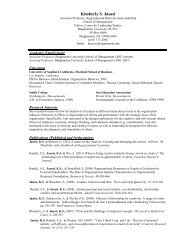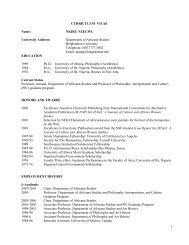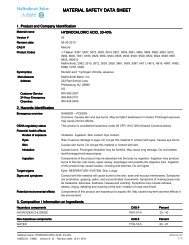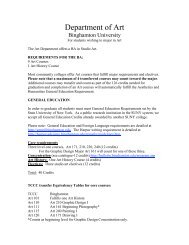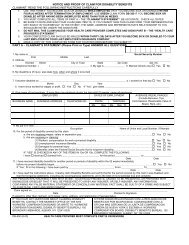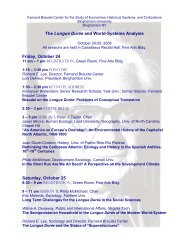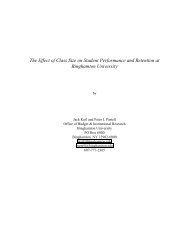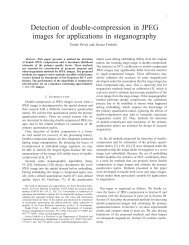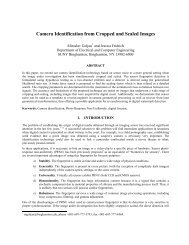14 Institute of Global Cultural Studies, <strong>Volume</strong> 8, <strong>Fall</strong> <strong>2010</strong>Interview with Professor F. Sonia Arellano-LópezBy IGCS reporterDr. F. Sonia Arellano-López joined the Instituteof Global Cultural Studies (IGCS) in <strong>Fall</strong><strong>2010</strong> as a Research Assistant Professor.Could you please tell us more about your academicbackground?I began my academic studies in La Paz,Bolivia in the Sociology and Political ScienceDepartment of the Universidad Mayor de SanAndres. During my second year at the Universitythere was a military coup and the universityclosed. Many university students were taken incustody. Some spent some time in jail, otherswere deported, and others looked for asylum atthe embassies. As a result, I moved to Quito,Ecuador where I continued my studies at thePontificia Universidad Católica del Ecuador.There I obtained my bachelors degree in Sociologyand Political Science. Later, I completed myM.A. and Ph.D. degrees in Sociology at <strong>Binghamton</strong>University.What are you recent research interests?I have been interested for many years ingrassroots social movements, and particularly inthe struggles of indigenous people. Many socialmovements have developed around strugglesover land and natural resources, and I am interestedin how people‘s relationships to land, or therelationships they want to have with land, influencehow they define their political goals andstrategies. My doctoral research was on howtrade and commerce in Botswana was organizedalong lines of race and ethnicity. This has led meto be interested in the roles of race, ethnicity, andculture as sources of identity as well as organizingaxes of human productive activities.How did you come to know about ProfessorMazrui and his work?When I was a doctoral student at SUNY-<strong>Binghamton</strong>I read Professor Mazrui‘s work, and manypeople that I have worked with in southern Africahave been influenced by Professor Mazrui‘swork. His writing has provided material for manyinteresting conversations about developmentissues in Africa.What are the factors that have shaped yourscholarly pursuits?Two factors have been very important forme. One is that my parents were from modestsocioeconomic circumstances, and they believedstrongly that education was a key for understandingthe world and improving one‘s situation in it.They encouraged me to study and do my best,even when circumstances made study difficult.The second is that, while I was growing up, politicalinstability was a defining factor of life in Bolivia.That instability, and the associated conflict,made me want to understand the origin and dynamicsof political struggles.Your dissertation was on the historical developmentof ethically based networks of tradeand commerce in Botswana. Could youplease tell us more about your dissertation?My dissertation research focused on hownetworks of trade and commerce in colonial Botswanadeveloped along ethnic lines. Africanswere largely excluded from entrepreneurial rolesby the colonial authorities. However, the Europeanswho were there representing colonial authoritieswere only interested in those aspects oftrade and commerce that had to do with generatingwealth for Great Britain and extending Britishpower in southern Africa. This left many spacesthat were filled by Asians, but with many restrictions.As a result, trade and commerce was organizedalong ethnic lines, according to a racialhierarchy that was enforced by the colonial government,but which functioned on a day-to-daybasis based on informal rules. When Botswanabecame independent, the ethnic organization oftrade and commerce, along with the informal arrangementsamong different ethnic groups, continuedin the new context.What aspects of your previous work dealtwith the issue of culture?Most of my work has dealt with the issue ofculture. Culture underlies the way that peoplerelate to one another, in a context of trade andmarket relations, or in social conflicts over landand resources. It often is not explicit, and is embeddedin other issues, but it is always there.You have a wide experience working withNGOs, particularly on issues related to gender,culture and the environment, in whatNGOs activity are you currently involved?I should clarify that I am not working withany NGOs now, and all of my work is with theInstitute. I have worked with NGOs and developmentagencies interested in understanding socialconflicts in order to support poor rural populations,particularly populations composed of indigenouspeople, in improving their quality of life.This work enriched my professional development,because it forces you to confront socialtheory with empirical reality. This confrontation isusually more messy, and complicated, than mostof our academic publications suggest, and it challengesyou to reflect and question what you thinkyou know and understand.You are in the process of finalizing a numberof papers as well. Could you please tell usmore about your work that is still in progress?I am currently working on several articlesthat develop themes from my doctoral research,and I hope to turn my dissertation into a book. Iam also working on some Latin American materialthat has to do with indigenous women andenvironmental conservation. I am also finishingan entry on Sojourner Truth for an encyclopediaof Great African American Lives, which will bepublished by Salem Press.Which of the IGCS projects will you be involvedin? Could you please tell us moreabout your IGCS project plans?I have been working with ProfessorMazrui to help with the editing of some of hismanuscripts for publication. I also enjoy teachingand plan to teach some classes looking at culturalissues that complement what ProfessorsMazrui and Adem are already offering. Since mygeographic expertise is different from theirs, Ithink we have an opportunity to learn from oneanother. I know I have been learning a lot fromthem. Of course generating external funding is animportant task for any university professor, especiallyduring difficult economic times like we arecurrently experiencing. So, I hope to be successfulin developing some project to bring outsidefunds to the university that will help strengthenthe Institute‘s program.
Institute of Global Cultural Studies, <strong>Volume</strong> 8, <strong>Fall</strong> <strong>2010</strong> 15Indigenous People and the Promotion ofEnvironmental Conservation and Sustainable DevelopmentBy F. Sonia Arellano-LópezThere is currently great worldwide concernabout environmental issues generally, and thespecific actions needed to address the impacts ofclimate change. Developing countries are a focalpoint of this concern, and numerous donor organizationsare providing financial support in thename of improving their capacity to managenatural resources. This may be seen in a varietyof areas, including from policy reforms to reducecarbon emissions and manage carbon stocks,local-level projects to make the farming systemsof poor families more resilient in the face of climatechange, and the promotion of clean energyranging from the promotion of more efficient cookstoves to support for alternate fuel development.While diverse in their specific content these effortsshare stated objectives to promote sustainableuse of natural resources. Because efforts topromote environmental conservation and/or environmentallysustainable economic growth challengeexplicitly or implicitly models of economicgrowth that have dominated the thinking of donororganizations until very recently, there is a widespreadassumption that poor people will be majorbeneficiaries of development efforts based on thenew environmental consciousness.This assumption is particularly strong withrespect to indigenous peoples in Latin America.Not only are they among the poorest and mostoppressed people within many of the states inwhich they reside, we also tend to regard themas part of the environment we seek to protect.This vision contrasts with our self-image, whichtends to view the growth of Western society as aprogressive distancing from the limitations imposedby the natural environment. Thus, one featureof our concern with conservation and sustainabledevelopment is that we often turn toindigenous peoples for knowledge about how touse natural resources in ways that provide alternativesto the destructive and non-sustainablepattern of resource use commonly associatedwith the expansion of capitalist production relations.2A more critical understanding of the costs ofparticular patterns of economic growth will undoubtedlyyield social as well as environmentalbenefits. Similarly, it may well be that the productionknowledge of Native People contains importantunderstanding about the biological bases ofsustainable production systems, as well as aboutthe social and institutional relations required forthem to function. At the same time, efforts topromote environmental conservation and sustainabledevelopment and to improve the well beingof Native People also need to be subject to importantcaveats. First, the destructive use of naturalresources associated with capitalist economicgrowth has been closely linked to strugglesover access to land and other resources. To theextent that conservation and sustainable developmentefforts fail to promote institutional arrangementsthat equitably resolve these conflicts,their results will be disappointing. 3Second, as researchers such as Bartra(1992) have pointed out, Western assumptionsabout Native People as being close to naturehave more to do with our images of ourselves asbeing separate from nature than they do with anyparticular understanding of the historical contextin which their production systems have developed.If it is true that there are examples of NativePeople who offer the hope that their knowledgecan be the basis of sustainable patterns ofland management, and who seek to advancetheir struggles for land and political autonomythrough alliances with international environmentalinterests, it is also true that there are many moreNative People who are both major agents andvictims of environmental destruction, where conservationefforts have made environmental destructionworse by ignoring the historical circumstancesthat have fostered particular kinds ofland use. 4There are no clear, unequivocal criteria forclassifying specific people as ―indigenous,‖ inLatin America, or elsewhere. Phenomena associatedwith changing production relations in thecountryside, like rural-urban migration and agrarianreform have often disrupted customs, the useof indigenous languages, and land tenure relationsthat mark and reinforce the ethnic identity.This has increased assimilationist pressures onall but the most isolated populations. There areno reliable statistics that measure the numbers ofindigenous populations, or the degree to whichthey have been assimilated into the national societiesthat surround them. National populationcensuses are no more than rough guide becausemany governments tend to deny that their countrieshave substantial indigenous population. 5In this context, International Labor Organization(ILO) Convention No. 169, on Indigenousand Tribal Peoples, provides a description ofessential features of indigenous peoples. Thedeclaration defines as indigenous communities,peoples and nations that have a historical continuitywith the pre-invasion and pre-colonial societiesthat developed on their territories; andconsider themselves distinct from other sectorsof the societies now prevailing on those territoriesor parts of them. The declaration also affirms thatindigenous peoples represent non-dominant sectorsof the society and are determined to reserve,develop and transmit to future generations theirancestral territories and their ethnic identity asthe basis of their continued existence as peoples,in accordance with their own cultural patterns,social institutions and legal systems. 6The ILO declaration associates indigenouspeoples with a strong ancestral attachment toterritory and land issues, recognizing that historicallymost of them were integrated and subordinatedto broader economic and social groupingswithin colonial agricultural and mining systems.The subordination of indigenous peoples asfarmers and miners was understood as assimilationto the predominant economic system, andthe outcome of it was to deprive them of their socioculturalroots. Such assimilation often becamea justification for denying their right to territorydefined in terms of their indigenous identity.The declaration understands indigenouspeoples as integral collectivities, existing withinterritories, where western sociocultural and juridicalsystems prevail, adapting and modifyingsome of their patterns in order to survive in anunequal capitalist system. This is especially importantin cases where historical references tellus that the process by which their territory wasappropriated in the name of ―progress‖ and ―development‖signified the impoverishment andmarginalization of the already displaced indigenouspeople. 7It is the distinction between the individualand collective association of indigenous peopleswith economic, socio-cultural and juridical contextthat determines whom it is possible to categorizeas indigenous. Indigenous peoples who havebeen assimilated by the agricultural system areregarded first as peasants, small farmers orsmallholders. By the same token if they wereassimilated economically by the mining systemthey are regarded first as miners by governmentsand other interested parties. It is the associationof indigenous peoples with certain economicactivities that results in the loss of theirsocial, cultural and juridical systems, upon whichrests their collective identification in the overallsociety. Understanding the complexity of thedefinition of indigenous peoples and assumingthat they represent a collectivity as well individu-



